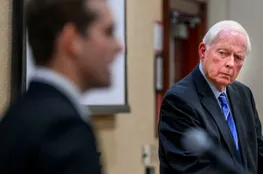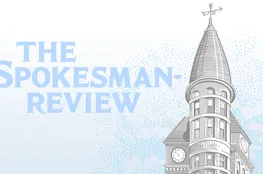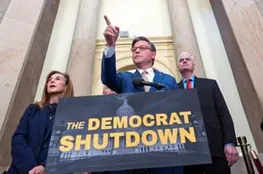AUSTIN, Texas — Texas lawmakers gavelled out of their 140-day legislative session on Monday after passing a raft of conservative policies, from private school vouchers to tighter bail laws, that furthered the state’s march to the right. The Legislature wrapped up without the same drama that defined the end of the last two sessions, when Democratic walkouts, a last-minute impeachment and unfinished priorities prompted overtime rounds of lawmaking. This time, Gov. Greg Abbott checked off every item on his main to-do list. Lt. Gov. Dan Patrick, the powerful hardline GOP Senate leader, accomplished the vast majority of his own priorities, working in concert with first-term House Speaker Dustin Burrows, R-Lubbock, to send a laundry list of conservative bills to Abbott’s desk. The GOP-controlled Legislature’s productive session left Democrats feeling dour with only scattered wins. They were able to block a handful of Republican priorities and they pushed several major bipartisan measures — from funding for public schools to water infrastructure — that made it across the finish line. As lawmakers prepare to depart Austin, here are some key issues that dominated the session and are now poised to become law. — Jasper Scherer
School vouchers and public education funding Texas GOP lawmakers exit the 2025 legislative session having taken care of their top two education priorities: private school vouchers and funding for public schools. Senate Bill 2, the voucher bill, will allow families to use $1 billion in taxpayer funds to pay for their children’s private school tuition and home-school expenses. House Bill 2, the school finance package, will send a roughly $8.5 billion boost to public schools to fund employee salaries, operational expenses, educator preparation, special education, campus safety and early childhood learning. Passage of both bills marks a 180-degree turn from the 2023 session, when vouchers failed to move forward and billions for public schools were withheld as a consequence, with Abbott saying he would only approve school funding once lawmakers passed vouchers. SB 2’s voucher program will launch at the beginning of the 2026-27 school year, with state officials expected to begin building the structure in coming months. HB 2 will soon allow Texas public schools to begin addressing some long-standing challenges, though advocates warn the money will likely not stave off budget deficits and campus closures.
THC and medical marijuana In a major win for Patrick, lawmakers approved a ban on products containing tetrahydrocannabinol, or THC, fulfilling the lieutenant governor’s priority of eradicating Texas’ booming hemp industry. Under legislation sent to Abbott last week, Senate Bill 3, hemp retailers and recreational users would be allowed to sell and consume only the non-intoxicating, non-psychoactive cannabinoids known as CBD and CBG. The potential ban on THC, the psychoactive element in marijuana, comes six years after lawmakers inadvertently touched off a boom in hemp-based products when they authorized the sale of consumable hemp in a move aimed at boosting Texas agriculture. The measure has met bipartisan resistance from veterans and activists in both parties, who say an all-out ban is a heavy-handed way of cracking down on the more than 8,000 loosely regulated retailers selling THC-laced edibles, drinks, vapes and flower buds across Texas. Hemp industry leaders and advocates have flooded Abbott with calls to veto the bill; the governor has stayed neutral on the issue this session and declined to say whether he plans to use his veto pen or let the bill become law. Proponents have sold the ban in part by touting the Legislature’s planned expansion of its limited medical marijuana program. Separate legislation sent to Abbott’s desk would significantly expand the list of qualifying conditions and allow for more licensed medical marijuana dispensers.
Stricter bail laws The Legislature adopted a sweeping package ushering in a crackdown on the state’s bail laws, a longtime priority of Abbott. Senate Joint Resolution 5 will appear on November’s ballot, asking voters to amend the state Constitution to require judges to deny bail, in certain cases, for the most violent offenses. The Texas Constitution currently grants almost everyone who is arrested the right to be released on bail, except for those charged with capital murder or accused of certain repeat felonies or bail violations. According to the U.S. Constitution and the U.S. Supreme Court, bail cannot be excessive, and pretrial detention largely should not be considered the default, as criminal defendants are legally presumed innocent. Proponents argued that stricter bail laws were necessary to protect the public from crime committed by dangerous defendants out on bail. The Legislature also passed Senate Bill 9, which limits who is eligible for a cashless bond. But two more bills that passed, addressing repeat offenders and those posing a danger to the community, were approved.
Water infrastructure To address the state’s growing water needs, lawmakers approved a slate of bills aimed at improving water infrastructure. Among the most significant was a $1.3 billion package to fund water conservation and management projects, including upgrades to reservoirs and the construction of new water storage facilities. The legislation also included provisions to promote the use of water-efficient technologies and practices.
Property tax cuts Lawmakers greenlit a fresh round of property tax cuts for Texas homeowners and businesses that voters must sign off on at the November ballot box. If passed, Texans who own their homes would get a bigger break on the taxes they pay to school districts via a boost in the state’s homestead exemption to $140,000 from $100,000. Homeowners 65 or older or those with disabilities would see an even bigger bump. Business owners stand to see breaks on the property taxes they pay on their inventory. Voters in November will decide whether that takes effect.
Housing Lawmakers enacted a spate of bills intended to tackle the state’s high home prices and rents, mainly by allowing more homes to be built. Among the most prominent were bills to allow smaller homes on smaller lots as well as apartments and mixed-use developments in more places, such as along retail and commercial corridors, in the state’s largest cities. They also approved a bill to make it harder for residents to stop new homes from being built. Other measures to make it easier to build additional dwelling units in the backyards of single-family homes and allow houses of worship to build homes on their land died.
DEI in K-12 schools Texas lawmakers wanted to give parents more say over what children are taught and which activities they join. A key part of this push is Senate Bill 12, which will ban diversity, equity and inclusion (DEI) practices in K-12 schools. The ban prohibits school districts from considering race, ethnicity, gender identity or sexual orientation in hiring and training. Lawmakers say DEI programs promote ideology over quality education. Parents can file complaints if they believe a school violates the ban, which can be escalated to the Texas Education commissioner. In addition, schools will be banned from authorizing or sponsoring student clubs based on sexual orientation or gender identity. The bill also requires parents to give consent for their children to participate in extracurricular clubs. Critics say the law could negatively impact LGBTQ+ students and encourage self-censorship among teachers. Lawmakers proposed amendments, allowing educators to opt out of teaching what goes against their personal beliefs and ensuring students still learn the “uncomfortable truths” of U.S. history, but they failed.
Higher education oversight Alarmed by last year’s ‘disruptive’ and ‘hate-filled’ pro-Palestinian demonstrations, conservative lawmakers pushed to exert greater control over public higher education. They passed Senate Bill 37, giving political appointees — not subject-matter experts — the authority to review and reject courses and the hiring of a provost or the chief academic officer. That bill creates an office to investigate complaints against universities and recommend funding cuts. Lawmakers also rolled back campus free speech protections with Senate Bill 2972, which gives politically appointed university regent’s the power to designate protest locations and prohibits students from erecting disguises or protesting noisily in certain situations. A proposal to eliminate in-state tuition for undocumented students advanced out of a committee for the first time in a decade but stalled before a full vote.
























